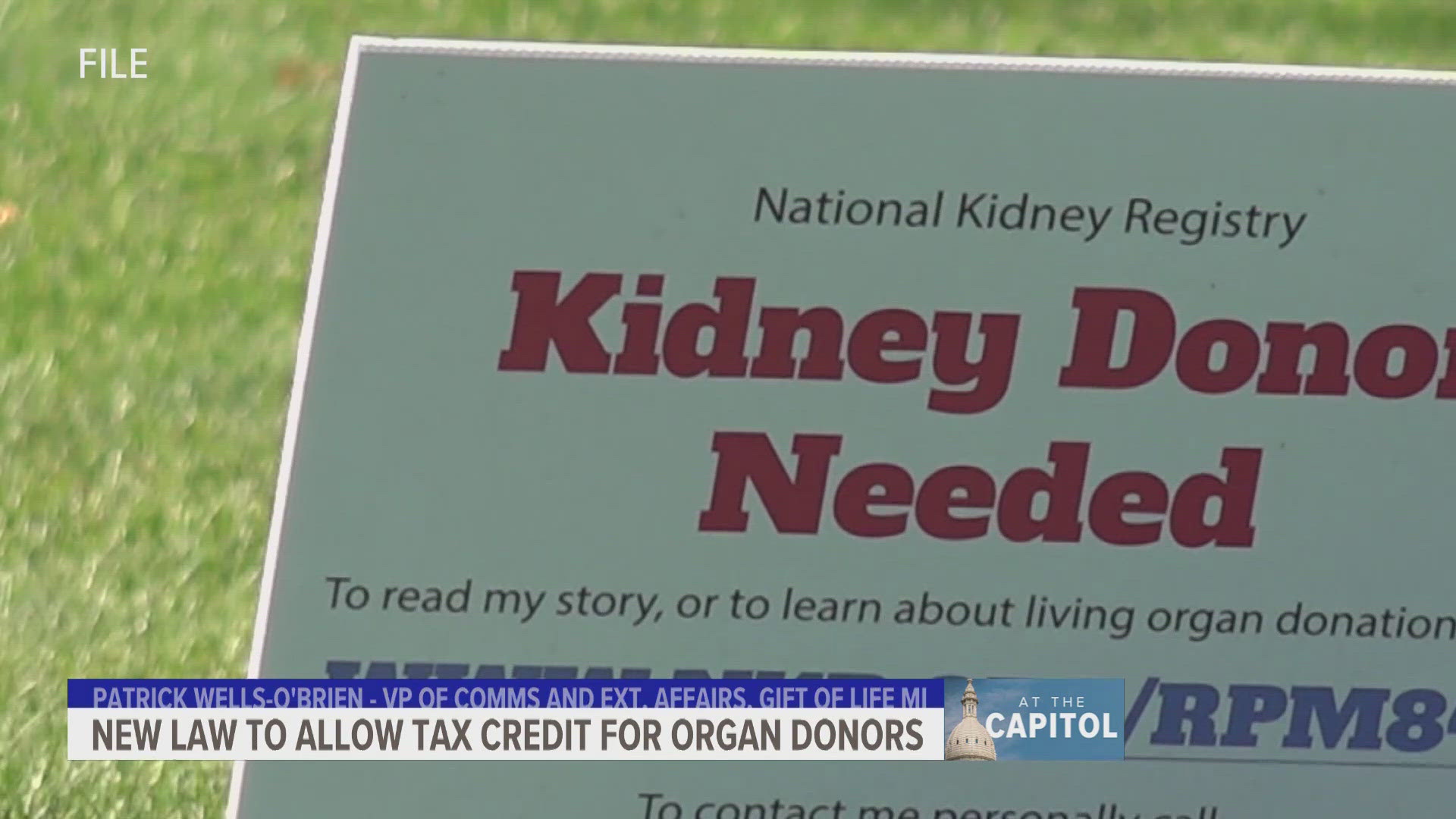GRAND RAPIDS, Mich. — A selfless act could be the difference between life and death for thousands across the state of Michigan.
"Currently in the state of Michigan, about 2,500 people are waiting for a life saving organ, and 80% of those people are waiting for a kidney," said Patrick Wells-O'Brien, who serves as the Vice President of Communications and External Affairs for Gift of Life Michigan, which labels itself on its website as "the state's federally designated organ and tissue recovery program."
But many times, saving a life comes with a cost.
"There should be no medical costs related to being a living organ donor," Wells-O'Brien said. "It's just these other costs that we feel have created a barrier to people saying 'yes.'"
While many organ donors are those who have passed but registered with the state to be a donor, live organ donation is also an option.
But costs for live donors like travel and lodging, lost wages and childcare can weigh on those wanting to say yes.
"The number of living organ donors has actually remained flat," Wells-O'Brien said.
Now, the state is hoping to change things.
A new state law signed last week is set to give a new, one-time tax credit to new live organ donors, up to $10,000 to help account for donation-related expenses.
"We just kind of followed the lead of other states," said State Rep. Felicia Brabec (D-Pittsfield Twp.), who introduced the bill in Lansing. "And that $10,000 number at this point seems to be able to almost cover doesn't not for everyone. It's not going to cover for everyone all those expenses that they'll incur, but it is the number that we've seen throughout the nation."
According to the legislation, donation-related expenses that were incurred in the tax year prior to, during or after the donation could count toward the credit.
The bill stipulates that the credit will either equal the unreimbursed expenses related to the donation or $10,000 - whichever is less.
Brabec told 13 ON YOUR SIDE, while the issue is important to her personally and has influenced legislation she's sponsored throughout her time in office, she does not have any immediate familial connection to the arena of organ donation.
Rather, the idea behind the legislation came from a conversation with the father of her son's friend at a basketball game.
"His dad is a transplantation surgeon," Brabec explained. "And so, he and I were just talking, and, you know, he was kind of talking about folks who give this incredible gift, and, you know, was just like, 'Felicia, you know what would be really helpful is, you know, we see this happen, and then there's no support on the non-medical side for folks.' And so that's what got this all started was a simple conversation in a hallway at, like, a grade school basketball game."
It's something that those like Wells-O'Brien and his colleagues hope will grow opportunities - opportunities to save the lives of those around us.
"We know that the number of living donors has remained flat," Wells-O'Brien said. "And we're hoping that removing some of these costs for people, allowing them to recover some of these costs on their income taxes, will help them say yes."
In response to the passage of the new law, the American Kidney Fund released that it had upgraded Michigan's ranking on its "State of the States: Living Donor Protection Report Card" from a C to a B.
The average rank in the U.S., the Fund said, was a C.
But in order to get it up to an A, Brabec believes additional legislation now making its way through Lansing could improve the state of play.
One, Brabec explained, was a bill introduced in May by State Sen. Kevin Hertel (D-St. Clair Shores), that would provide employers with a tax credit equal to the wages paid to employees while those employees were on organ donation leave.
Another Brabec seemingly referred to was a bill she had introduced in 2023 that would require the state to come up with "a model program of instruction in organ, eye, and tissue donation and transplantation programs."
Such a program, the bill outlines, would be crafted in consultation with parties including Gift of Life Michigan and would need to be made available by January 1, 2025.
"Right now, when students take driver's education, there's a segment one and segment two, and there's some organ donor education, but that takes place in segment two," Brabec said. "And our first-time drivers are asked that question if they want to be an organ donor for the first time at the end of segment one, when they're getting their permit, right? So, they're asked that question before they have the education."
Under that bill, public schools that offered education through at least ninth grade would need to ensure that such instruction was provided to students by the time they completed that grade.
Should the student's parent or legal guardian submit a written request, however, the student could be excused "without penalty" from that instruction.
"And that way," Brabec later said, referring to her bill, "all students, regardless if they take driver's education right away - or we're having more and more students wait until they're 18, and they don't have to pay those fees for driver's education - and so everyone, all of them, would have that education when they're asked those questions."
But whether such legislation makes it through by the end of this lame duck session remains to be seen, as both Hertel's bill and Brabec's donation education bill remain in committee.
In regard to Brabec's bill that was signed last week, while it passed with wide bipartisan support, it is set to take effect 90 days after the state legislature adjourns its 2024 session later this year.

